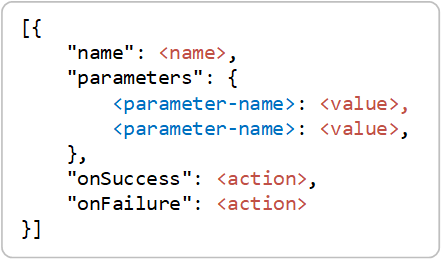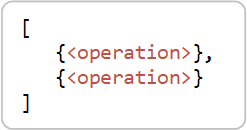Storage task operations
A storage task contains a set of conditions and operations. An operation is an action that a storage task performs on each object that meets the requirements of each condition. This article describes the JSON format of a storage task operation. Understanding that format is important if you plan to create a storage task by using a tool other than the Azure portal (For example: Azure PowerShell, or Azure CLI). This article also lists the operations, operation parameters, and the allowable values of each parameter.
This article focuses on operations. To learn more about conditions, see Storage task conditions.
Important
Azure Storage Actions is currently in PREVIEW and is available these regions. See the Supplemental Terms of Use for Microsoft Azure Previews for legal terms that apply to Azure features that are in beta, preview, or otherwise not yet released into general availability.
Operation format
An operation has a name along with zero, one, or multiple parameters. The following image shows how these elements appear for an operation in the JSON template of a storage task.

The following table describes each element.
| Element | Description |
|---|---|
name |
The name of the operation.1 |
parameters |
A collection of one or more parameters. Each parameter has parameter name and a parameter value.1 |
onSuccess |
The action to take when the operation is successful for an object. continue is the only allowable value during the preview. |
onFailure |
The action to take when the operation fails for an object. break is the only allowable value during the preview. |
1 For a complete list of operation names, operation parameters, and parameter values, see the Supported operations section of this article.
The following operation applies a time-based immutability policy to the object.
{
"operations": [
{
"name": "SetBlobImmutabilityPolicy",
"parameters": {
"untilDate": "2024-11-15T21:54:22",
"mode": "locked"
},
"onSuccess": "continue",
"onFailure": "break"
}
]
}
Multiple operations
Separate multiple operations by using a comma. The following image shows the position of two operations in list of operations.

The following JSON shows two operations separate by a comma.
"operations": [
{
"name": "SetBlobImmutabilityPolicy",
"parameters": {
"untilDate": "2024-11-15T21:54:22",
"mode": "locked"
},
"onSuccess": "continue",
"onFailure": "break"
},
{
"name": "SetBlobTags",
"parameters": {
"ImmutabilityUpdatedBy": "contosoStorageTask"
},
"onSuccess": "continue",
"onFailure": "break"
}
]
Supported operations
The following table shows the supported operations, parameters, and parameter values:
| Operation | Parameters | Values |
|---|---|---|
| SetBlobTier | tier | Hot | Cold | Archive |
| SetBlobExpiry | expiryTime, expiryOption | (expiryTime): Number of milliseconds (expiryOption): Absolute | NeverExpire | RelativeToCreation | RelativeToNow |
| DeleteBlob | None | None |
| UndeleteBlob | None | None |
| SetBlobTags | Tag name1 | Tag value |
| SetBlobImmutabilityPolicy | untilDate, mode | (untilDate): DateTime of when policy ends (mode): locked | unlocked |
| SetBlobLegalHold | legalHold | true | false |
1 The name of this parameter is the name of the tag.